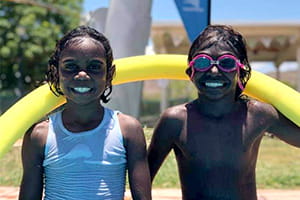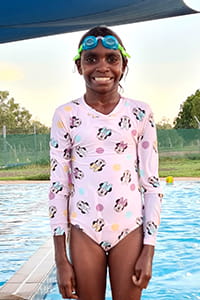Communities benefit from No School No Pool policy
‘No School, No Pool’ is the simple rule that is helping remote Aboriginal communities across WA improve the education and health of their children.
The Remote Aboriginal Swimming Pool (RASP) program, which is run by Royal Life Saving WA, operates in several remote locations across the state. The program works in consultation with communities to run safe, efficient and effective aquatic facilities and to meet the needs and expectations of the communities.

The concept of ‘no school, no pool’ was seen as an excellent way of getting children to attend classes by rewarding their attendance with admission to the pool after school. “Communities have embraced the No School, No Pool policy,” says Lauren Nimmo, Royal Life Saving WA Senior Manager Health Promotion & Research.
“School principals have reported a marked increase in school attendance and an overall improvement in the children’s behaviour. Research shows that school attendance increased by up to 25% during the pool season.”
Royal Life Saving research shows that swimming pools in remote Aboriginal communities are positive enablers of community cohesion, improved health and well-being and higher school attendance, particularly among primary school aged children.
“34% of pool visitations in these communities are primary school aged children,” said Lauren. “There were 18,703 pool visits among this age group, which is an average of 35 visits across the season for recreational swimming (excluding swimming lessons).”

Another popular initiative that runs in conjunction with the RASP program is the Go for 2&5 Regional and Remote Aboriginal Communities Swimming Program (
Swim for Fruit). Swim for Fruit encourages children to swim laps of the pool or complete other aquatic challenges to earn themselves a healthy afternoon tea following each session. In addition to fruit, participants can earn other incentives such as goggles, t-shirts and Swim and Survive packs.
The RASP program aims to increase Aboriginal participation in aquatic activities while achieving improvements in the realms of health, education and employment. The program is managed by Royal Life Saving WA and funded primarily through the Department of Communities, with additional contributions from Principal Community Partner BHP and the Telethon Kids Institute.
Learn more about the multiple benefits of this program at the link below.
